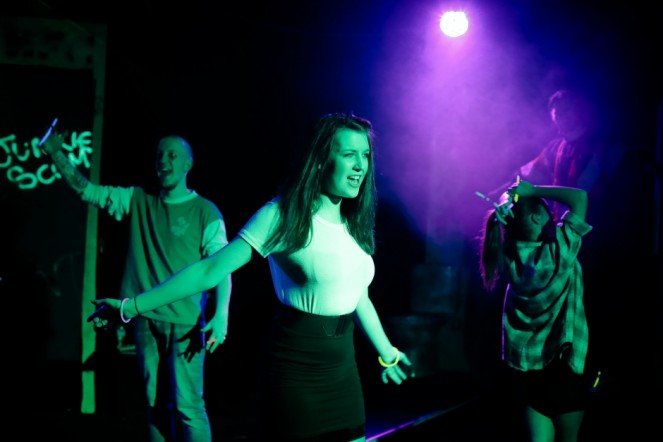
Irvine Welsh’s book catalogues the obstacles in the way of a young man trying to ‘choose life’ over the half-life and moral turpitude into which drug addiction has inevitably led. ‘Grim’ just about covers the milieu of the film version, but in director, Adam Spreadbury-Maher’s stage version (adapted by Harry Gibson) his audience is given a visceral experience unlike anything (of a theatrical nature) they may have encountered before. In the immediate cockpit of live theatre the ‘grim’ of the film looks almost genteel, ‘a wee bit pan loaf’. Coming into the auditorium, which is the temporarily repurposed Loco Klub, (for the Tobacco Factory’s ‘Beyond’ season) the audience (lambs and thrill seekers all) are shown to their seats by ravers who are dancing to the heavy electro-beat that drives the Dionysiac frenzy. In this immersive state, the director – a man of infinite jest – sets about the in-your-face assault, which draws the spectators ineluctably into the twilight world of the habitual drug user.
Renton (Gavin Ross), a seed of humanity flushed into a sewer, only awaiting a little fertile soil in which to settle and grow, narrates the story of his struggle with addiction amongst the underclass of Edinburgh and his attempt to go clean in stages. The first stage is to use suppositories of a drug less addictive than heroin, but having some unfortunate side-effects on his bowel movements. This degenerated into some farcical scatological business that had us laughing as we might have laughed at the botched beheading of Mary Queen of Scots, that is, a grim, buttock clenching laugh at the awfulness of it all. It gave new meaning to the phrase, ‘shit happens’.
Freezing the grins on our faces was the chilling and stomach-churningly accurate depiction of psychopathic hard-man, Begbie (Chris Dennis) who at one point kicks the belly of his pregnant girlfriend (Erin Marshall). Abandon is perhaps the only way to deal with such acting challenges and the cast throw themselves into the task with unabashed honesty. Jessica Innes, for example, moves from voracious sex-pot to concerned mum, showing a self-affirming will-power in the former which she does by fully embracing the character’s spirit as when, hilariously, she demands sex from her partner.
Trainspotting is, strangely, given its darkly comic depiction of utter depravity and tragedy, a play of hope. A hope that however lost a piece of humanity seems, there lurks within a yearning for choosing life over nihilism. The production, which is touring from the Kings Head, is visceral, honest, theatrically astute and does justice to what has become a cult classic. Fans of the book and film will not be disappointed with this compelling example of ‘immersive’ theatre. ★★★★☆ Graham Wyles 8th April 2016

